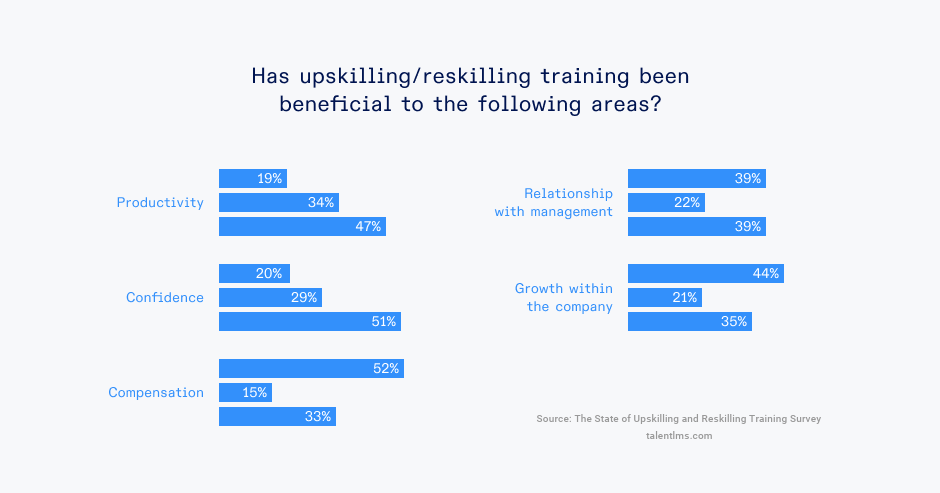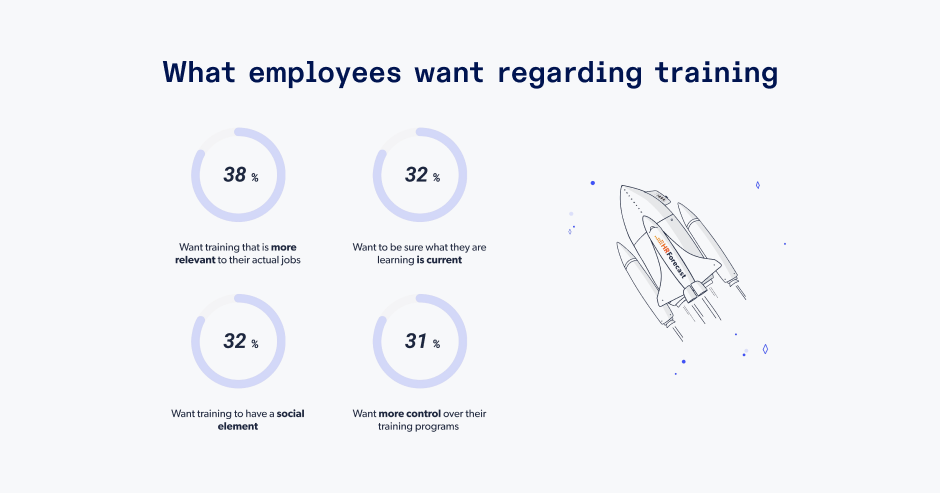As the demand for tech talent continues to rise, the importance of ongoing training and upskilling cannot be overstated.
Remote developers play a pivotal role in shaping the digital world, from creating innovative apps to developing complex systems that power our modern lives.
As technology advances at an unprecedented pace, stagnation in skills can quickly render developers obsolete. According to a survey conducted by LinkedIn in 2022, over 80% of professionals believe that learning and development opportunities are crucial for career growth. This sentiment is even more pronounced in the tech industry, where new programming languages, frameworks, and tools emerge regularly.
To remain relevant and competitive, remote developers must embrace continuous training and upskilling. As projects become more diverse and complex, developers who invest in learning stay equipped to handle new challenges. Moreover, upskilling boosts confidence, increases job satisfaction, and enhances earning potential. Developers who continuously update their skill set are more likely to land lucrative projects and enjoy long-term success in the remote work landscape.

In this article I’ll uncover the essential upskilling and training strategies to help you improve your remote developer career and adapt quickly to the dynamic technology landscape.
Strategies for Empowering Remote Developers
1. Subscribe to Newsletters
Staying informed is the first step in the upskilling journey. Subscribing to newsletters from tech industry leaders, online learning platforms, and relevant blogs can provide valuable insights into the latest trends, tools, and best practices. Newsletters like "DevOps Digest" and "Hacker Newsletter" curate top articles, tutorials, and news, ensuring developers are always in the know.
2. Join Discord Community Servers
Discord servers have become hotspots for tech enthusiasts to gather, share knowledge, and collaborate. These servers offer real-time discussions, troubleshooting assistance, and networking opportunities. Whether a developer is interested in machine learning, web development, or ethical hacking, there's likely a Discord server dedicated to the topic. The "Programmer’s Hangout" server, for instance, boasts a vibrant community of over 150,000 members.
Join our Index Discord community today and be part of a supportive and dynamic environment that fuels your growth as a remote developer. Click here to join now and embark on a journey of empowerment →
3. Work on Personal Projects and Write Articles
Hands-on experience is invaluable for remote developers. Creating personal projects allows developers to apply new skills in practical scenarios, honing their expertise while building an impressive portfolio. Writing articles about these projects not only reinforces the learning process but also showcases the developer's capabilities to potential clients and employers. Platforms like Medium and Dev.to are excellent spaces to share insights and tutorials.
4. Explore Online Learning Platforms
Online learning platforms like Coursera, Udemy, and Pluralsight offer a plethora of courses catering to various skill levels and tech domains. Whether a developer aims to learn a new programming language, delve into artificial intelligence, or master cloud computing, these platforms provide structured learning paths. For instance, Google Cloud's "Coursera Specialization" offers comprehensive training on cloud technologies.
5. Read Tech Blogs and Listen to Podcasts
Tech blogs and podcasts are treasure troves of information, often presented in accessible and engaging formats. Reading blogs like "CSS-Tricks" or "Smashing Magazine" provides in-depth insights into web development trends, while podcasts like "Software Engineering Daily" offer in-depth interviews with industry experts, sharing their knowledge and experiences.
6. Harness Social Media Engagement
Social media platforms like Twitter and LinkedIn are not just for networking; they're also hubs of knowledge exchange. Following tech thought leaders, participating in relevant discussions, and joining tech-related groups can expose remote developers to diverse perspectives and insights. The #100DaysOfCode challenge, for instance, encourages developers to code consistently and share their progress on social media.

Examples in Action
Consider the journey of Emily, a remote developer looking to upskill. Emily subscribes to newsletters from GitHub, Codecademy, and the "Frontend Masters" online platform. This helps her receive curated content and updates on the latest programming languages and tools. She joins the "DevDiscuss" Discord server, where she engages in discussions about web development trends and receives real-time help with coding issues.
To gain hands-on experience, Emily starts working on a personal project—an e-commerce website using the MERN stack. As she tackles challenges and learns new techniques, she documents her progress in articles on Medium. This not only solidifies her understanding but also showcases her skills to potential clients.
Emily also explores online learning platforms like Udemy, where she enrolls in a comprehensive course on responsive web design. Additionally, she listens to the "Coding Newbies" podcast during her daily walks, gaining insights from fellow developers' experiences.
By engaging with tech blogs like "A List Apart" and following influential developers on Twitter, Emily expands her knowledge horizon. She actively participates in discussions about the future of web development and shares her insights using relevant hashtags, connecting with like-minded professionals.
Are you a talented software developer looking for a long-term remote tech job? Try Index.dev! What’s in it for you? High-paid remote jobs with top US, UK, EU companies, flexible working hours, and stellar career growth→
Conclusion
In the rapidly evolving landscape of technology, continuous training and upskilling are non-negotiable for remote developers. The strategies outlined above - are potent tools for empowering remote developers on their journey to mastering new skills and staying at the forefront of their field. As the tech industry continues to transform, embracing these strategies will not only enable remote developers to thrive but also ensure they shape the future of digital innovation.
If you’re a senior developer looking for a remote software job, Index.dev may be able to help you very quickly. Index.dev engineers earn competitive salaries that surpass the market average in most countries. Register now to know more!